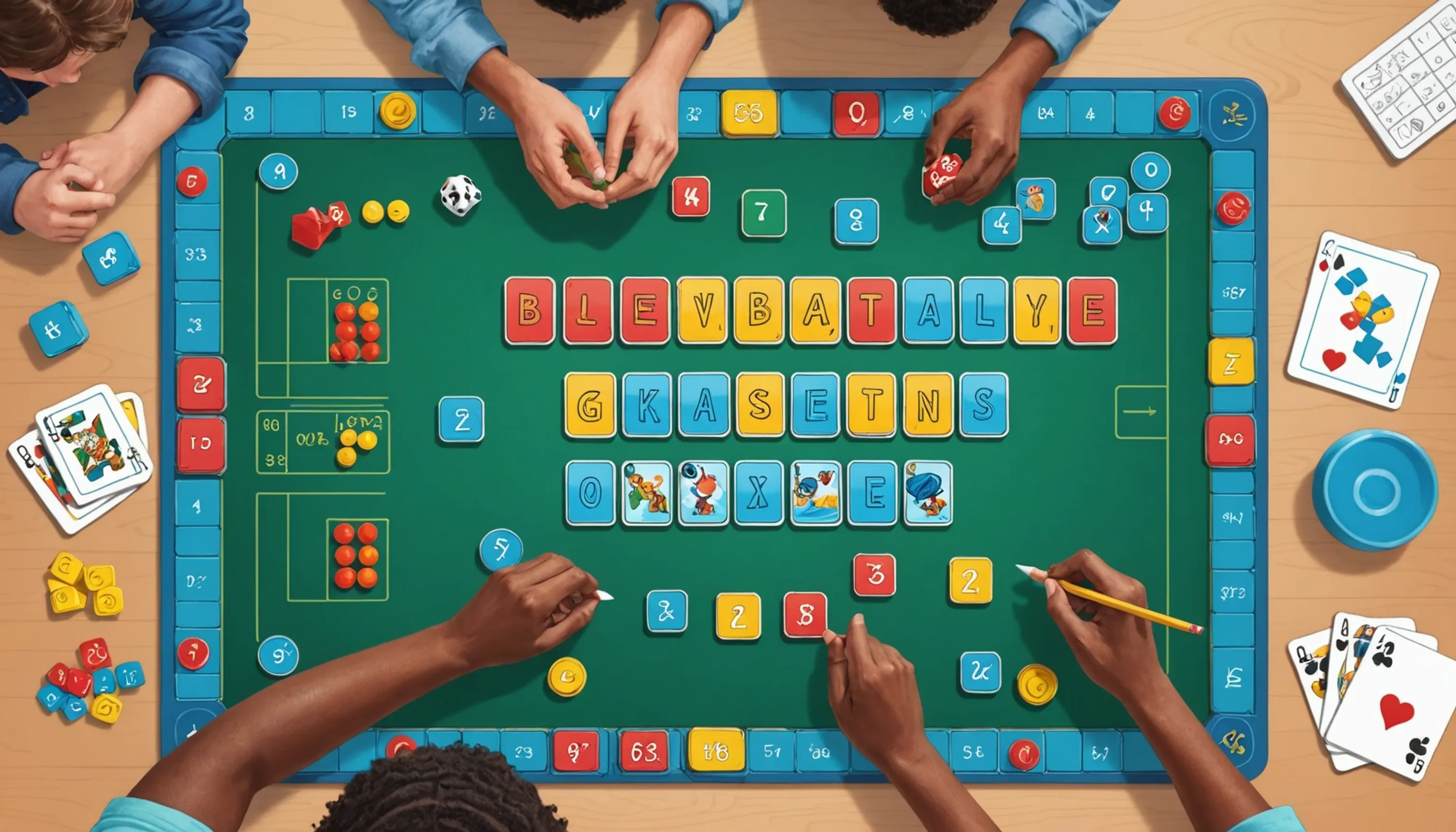Fun Math Games for Teenagers
 HvWHenry van Wagenberg
HvWHenry van Wagenberg
Fun Math Games for Teens: Engaging Hobbies to Boost Skills
Fun math games for teens can transform learning into an enjoyable experience. Engaging in these games not only enhances math skills but also fosters critical thinking and problem-solving abilities. Examples include interactive online games, math puzzles, and trivia challenges that spark competition among friends.
Additionally, math games often incorporate real-life scenarios, making abstract concepts more tangible. This approach helps teens see the practical application of mathematics, encouraging them to explore the subject further. Whether at home or in a classroom, these games serve as a dynamic way to boost skills while having fun.
Benefits of Math Games for Teenagers
Math games offer numerous benefits for teenagers, making learning both enjoyable and effective. Firstly, they enhance problem-solving skills. By tackling various challenges, teens learn to think critically and develop strategies to find solutions. This skill set is invaluable not only in mathematics but across various subjects and real-life situations.
Secondly, math games help improve numerical fluency. Engaging with numbers in a fun context allows teens to practice arithmetic operations without the pressure of traditional testing. This frequent exposure helps solidify their understanding and builds confidence in their abilities.
Thirdly, these games foster a sense of competition and teamwork. Many math games involve collaboration, encouraging teenagers to work together to achieve common goals. This camaraderie helps strengthen social bonds and enhances communication skills.
Moreover, math games can reduce math anxiety. When learning is transformed into a game, the pressure often associated with mathematics diminishes, allowing teens to approach problems with a more positive mindset. This shift can lead to a greater interest in the subject and increased motivation to learn.
Additionally, math games can be tailored to various learning styles. Whether through visual aids, hands-on activities, or interactive technology, these games can cater to each teen’s unique way of learning, making mathematics more accessible and enjoyable. In summary, incorporating math games into learning can significantly benefit teenagers in multiple ways.

Types of Math Games to Explore
When it comes to enhancing math skills for teenagers, there are various types of math games to explore. Each type caters to different interests and learning styles, making mathematics more engaging and enjoyable.
1. **Board Games**: Traditional board games like Monopoly or Prime Climb incorporate mathematical concepts in a fun way. Players engage in calculations and strategy, reinforcing their math skills while having a great time with family and friends.
2. **Card Games**: Games such as Math War or 24 Game allow teens to practice arithmetic in a competitive format. These games challenge players to use their mental math skills quickly, fostering both speed and accuracy.
3. **Online Games**: Websites and apps like Kahoot! and Prodigy Math offer interactive platforms where teens can compete against peers or work independently. These games often adapt to a player's skill level, ensuring an appropriate level of challenge.
4. **Puzzle Games**: Sudoku and logic puzzles engage critical thinking and problem-solving skills. These games require players to think creatively and strategically, making them excellent tools for developing higher-order thinking.
5. **DIY Games**: Creating custom math games at home can be both fun and educational. Parents and teens can design games that focus on specific math skills, tailoring the experience to their needs and interests.
Exploring these diverse types of math games can make learning enjoyable while significantly enhancing math skills for teenagers.
How to Incorporate Math Games into Daily Learning
Incorporating math games into daily learning can be simple and effective. Start by setting aside specific times each week dedicated to playing math games, whether it’s during homework sessions or family game nights. Use online platforms or apps to introduce variety and keep things engaging.
Additionally, integrate math games into routine activities. For example, while cooking, ask teens to measure ingredients, reinforcing fractions and conversions. Involve them in budgeting for groceries, using real-life math skills.
Finally, encourage friendly competition by challenging friends or family members, making learning fun and interactive.

Using Online Resources and Apps
Utilizing online resources and apps is an excellent way to enhance math learning for teenagers through engaging and interactive experiences. Many websites and mobile applications offer a wide range of math games that cater to various skill levels and learning styles.
1. **Kahoot!**: This platform allows teachers and parents to create customized quizzes and games that can be played in real-time. The competitive nature of Kahoot! makes it exciting for teens while reinforcing their math skills.
2. **Prodigy Math**: Prodigy is an adaptive math game that aligns with the curriculum, allowing students to practice math concepts in a fantasy world. As they progress through challenges, they can earn rewards and level up, making learning feel like an adventure.
3. **Coolmath Games**: This website features a variety of math-based games that promote critical thinking and problem-solving. From logic puzzles to strategy games, Coolmath provides numerous options that make math fun.
4. **Mathway**: While not a game per se, Mathway is a powerful tool for homework help. It allows students to input problems and receive step-by-step solutions, reinforcing their understanding of concepts.
5. **YouTube Channels**: Channels like Math Antics and Khan Academy offer engaging video lessons that explain complex concepts in an easy-to-understand manner. These videos often incorporate games and interactive elements.
By leveraging these online resources and apps, parents and educators can create a dynamic learning environment that keeps teenagers motivated and excited about math.
Creating a Math Game Night at Home
Creating a Math Game Night at home can be a fun and educational way to engage teenagers with mathematics. To get started, gather a variety of math games that cater to different skill levels and interests. This could include board games, card games, and DIY math challenges that you can create together.
1. **Set a Date and Time**: Choose a regular evening each week or month to dedicate to Math Game Night. Consistency helps build excitement and anticipation.
2. **Invite Family and Friends**: Encourage your teenager to invite friends or family members to join. The more participants, the more fun and engaging the games will be. This also fosters a sense of community and friendly competition.
3. **Mix It Up**: Incorporate various types of games, such as board games like Monopoly, card games like Math War, and online games. Mixing different formats keeps the evening exciting and caters to everyone’s preferences.
4. **Create Challenges**: Introduce time-limited challenges or tournaments with small prizes for the winners. This not only makes the games more competitive but also motivates participants to improve their skills.
5. **Reflect and Discuss**: After the games, take some time to discuss what everyone learned or found challenging. This reflection helps reinforce the concepts practiced during the evening.
By planning a Math Game Night, you create an enjoyable atmosphere that promotes learning while strengthening relationships among family and friends.
Math Board Games for Family Fun
Math board games offer an excellent way for families to bond while enhancing mathematical skills. Games like Monopoly teach budgeting and strategy, while Prime Climb helps players practice multiplication and prime numbers. Sum Swamp introduces younger players to addition and subtraction in a fun, engaging way.
These games encourage teamwork and friendly competition, making learning enjoyable for all ages. Additionally, they provide opportunities for parents to get involved in their children’s education, fostering a positive attitude towards mathematics. Incorporating math board games into family game nights can create lasting memories and valuable skills.
Popular Math Board Games for Teens
Math board games can be a fantastic way for teens to sharpen their math skills while enjoying quality time with family and friends. Here are some popular math board games that are both engaging and educational:
1. **Prime Climb**: This vibrant, strategic board game helps players master multiplication, division, and prime numbers. Players navigate a colorful board to reach the finish line, using math skills to advance while thwarting their opponents.
2. **Math Dice**: A fast-paced game that combines luck and strategy, Math Dice encourages players to use basic arithmetic to reach a target number. It’s easy to set up and can be played in under 30 minutes, making it perfect for quick family game nights.
3. **Money Bags**: This game teaches teens about money management and budgeting. Players collect coins and learn to make change, reinforcing essential financial skills in a fun and interactive way.
4. **Set**: A game of visual perception that requires players to identify sets of cards based on different attributes. While it’s not exclusively a math game, it promotes logical reasoning and critical thinking.
5. **Blokus**: A strategy game that involves spatial reasoning and planning, Blokus challenges players to fit their pieces on the board while blocking their opponents. This game develops strategic thinking and spatial awareness, both critical components of mathematical reasoning.
Incorporating these popular math board games into your routine can make learning math enjoyable and effective for teens.
DIY Math Games You Can Create at Home
Creating DIY math games at home can be a fun and educational way to engage teenagers with mathematics. These games can be tailored to specific skills and interests, making learning enjoyable. Here are some ideas for DIY math games:
1. **Math Jeopardy**: Create a Jeopardy-style game by designing categories related to different math topics, such as algebra, geometry, or fractions. Use index cards to write questions of varying difficulty, and have players select questions to earn points.
2. **Math Bingo**: Make Bingo cards filled with answers to math problems. Call out math problems, and players must solve them to find the corresponding answer on their card. This game reinforces quick thinking and problem-solving.
3. **Fraction War**: Use a deck of cards and assign each suit a different fraction. Players flip two cards and create a fraction from the numbers. The player with the highest fraction wins the round. This game helps reinforce fraction concepts and comparisons.
4. **Math Scavenger Hunt**: Create a scavenger hunt where each clue involves solving a math problem to find the next location or item. This interactive game encourages movement while practicing math skills.
5. **Dice Games**: Use dice to create various games. For example, roll two dice and have players add, subtract, or multiply the numbers. This helps reinforce basic arithmetic skills in a fun way.
By designing these DIY math games, you can make learning math engaging and tailored to your teen’s interests.
